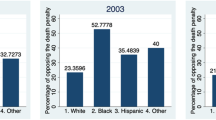Abstract
Recently, Chinese government implemented and tested a trial waiver system in 18 large cities during 2016–2018. Using data collected from surveys of prosecutors and defense lawyers in one of the cities, the present study examines the main challenges in the implementation by comparing prosecutor and defense lawyer views. The main issues examined include the legal scope of trial waivers, the lawyer and victim roles in trial waivers, and the risk of corruption and power abuse. The findings indicate that lawyer respondents significantly differed from prosecutor respondents in their views on the issues. Defense lawyers were more likely to adopt a liberal stance and took a critical attitude toward the issues than prosecutors were. Their characteristic responses may well reside in their legal statuses and related interests in the Chinese legal context.
Similar content being viewed by others
Notes
No incentives were provided for both of prosecutors and defense lawyers for their participations in the surveys.
We used SPSS box plot and residual plots to assess the potential outliers and heteroscedasticity of the index variable for OLS regression. No outliers and heteroscedasticity were found.
References
Belkin, I. (2008). Plea bargaining or plea agreement: An American prosecutor’s view. Journal of Law (in Chinese), 7, 56–59.
Bibas, S. (2016). Designing plea bargaining from the ground up: Accuracy and fairness without trials as backstops. William & Mary Law Review, 57, 1055–1081.
Biddle, B. J. (1986). Recent development in role theory. Annual Review of Sociology, 12, 67–92.
Chen, W. (2016). Analysis of the trial waiver system. Journal of Chinese Law (in Chinese), 2, 48–69.
Clark, John P. (1989). Conflict management outside the courtrooms of China. pp. 57–69 in Social control in the People’s Republic of China, edited by Ronald Troyer, John Clark and Dean Rojek. New York: Praeger.
Dai, Y. (2001). New directions of Chinese policing in the reform era. pp. 151–158 in Crime and social control in Changing China, edited by Jianhong Liu, Lening Zhang, and Steven Messner. Westport, CT: Greenwood.
Fair Trials. (2017). The disappearing trial: Towards a rights-based approach to trial waiver systems. Retrieved https://www.fairtrials.org/wp-content/uploads/.../Report-The-Disappearing-Trial.pdf
Fairbank, J. (1987). The great Chinese revolution: 1800–1985. Harper and Row.
Felkenes, G. T. (1989). Courts, sentencing, and the death penalty. pp. 141–158 in Social control in the People’s Republic of China, edited by Ronald Troyer, John Clark and Dean Rojek. NY: Praeger.
Hu, M. (2018). The role of lawyers in trial waivers. Journal of Chinese Criminal Laws (in Chinese), 5, 115–126.
Langer, M. (2004). From legal transplants to legal translations: The globalization of plea bargaining and the Americanization thesis in criminal procedure. Harvard International Law Journal, 45: 1–64.
Lubman, S. (1983). Comparative criminal law and enforcement: China. Pp. 182–192 in Encyclopedia of crime and justice, edited by Sanford H. Hadish. New York: Free Press.
McCabe, E. J. (1989). Structural elements of contemporary criminal justice in the People’s Republic of China Pp. 115–129 in Social control in the People’s Republic of China, edited by Ronald Troyer, John Clark and Dean Rojek. NY: Praeger.
Munro, D. J. (1977). The concept of man in contemporary China. University of Michigan Press.
Rakoff, J. S. (2021). Why the innocent plead guilty and the guilty go free. Farrar, Straus and Giroux.
Rojek, D. G. (1996). Changing directions of Chinese social control. Pp. 234–249 in Comparative criminal justice: Traditional and nontraditional systems of law and control, edited by Charles B. Fields and Richter H. Moore, Jr. Prospect Heights, IL: Waveland Press.
Russell, J., & Hollander, N. (2017). The disappearing trial: The global spread of incentives to encourage suspects to waive their right to a trial and plea guilty. New Journal of European Criminal Law, 8, 309–322.
Qin, Z. (2017). Research issues in the trial waiver system. Journal of Chinese Criminal Law (in Chinese), 7, 110–137.
Thaman, S. C. (2010). A typology of consensual criminal justice procedures. Pp. 304–330 in World plea bargaining: Consensual procedures and the avoidance of the full criminal trial, edited by Stephen Thaman. Durham: Carolina Academic Press.
Turner, J. I. (2017). Plea bargaining and international criminal justice Pacific L. Rev. 219. SMU Dedman School of Law Legal Studies Research Paper No. 347, Available at SSRN: https://ssrn.com/abstract=2924610.
Troyer, R. J. (1989). Chinese thinking about crime and social control. pp. 45–56 in Social control in the People’s Republic of China, edited by Ronald Troyer, John Clark and Dean Rojek. NY: Praeger.
Zhang, L., Zhou, D., Messner, S. F., Liska, A. E., Krohn, M. D., Liu, J., & Zhou, Lu. (1996). Crime prevention in a communitarian society: Bang-jiao and Tiao-jie in the People’s Republic China. Justice Quarterly, 13, 199–222.
Zhang, L., Messner, S. F., & Liu, J. (2007). A multilevel analysis of the risk of household burglary in the city of Tianjin, China. The British Journal of Criminology, 47, 918–937.
Zuo, W. (2017). Plea bargaining: Achieving efficiency? Journal of Legal Studies (in Chinese), 6, 160–181.
Author information
Authors and Affiliations
Corresponding author
Ethics declarations
Ethics Approval
The study received ethical approval from the Law School Office of Zhejiang University.
Informed Consent
Respondents received informed consent for their participation in the surveys.
Conflict of Interest
The authors declare no competing interests.
Additional information
Publisher's Note
Springer Nature remains neutral with regard to jurisdictional claims in published maps and institutional affiliations.
Rights and permissions
About this article
Cite this article
Zhang, L., Hu, M. Prosecutors’ and Defense Lawyers’ Views on the Challenges to a New Trial Waiver System in China. Asian J Criminol 17, 175–191 (2022). https://doi.org/10.1007/s11417-021-09359-y
Received:
Accepted:
Published:
Issue Date:
DOI: https://doi.org/10.1007/s11417-021-09359-y




